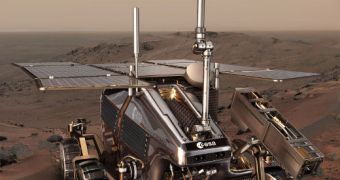Earlier this year, the European Space Agency (ESA) and NASA signed a partnership together, which saw the creation of a joint task force for Martian explorations. The signing was hailed as an achievement at the time but, until now, there has been the risk that the governments involved in ESA will not go along with the decisions. The fears were just proven to be unfounded, as the states in the organization gave their consent for the two-part mission, and decided to infuse new funds into assets such as the ExoMars rover, Space reports.
Under the new agreement, the ExoMars mission has been extended to include a lander and an orbiter, in addition to the large-scale rover that ESA designed. Moreover, the two space agencies decided to launch these pieces of equipment in two separate launches, one scheduled for 2016, and the other for 2018. NASA too said that it would build a small lander – a weather station – as well as a smaller rover, in addition to its Mars Science Laboratory (MSL) mission, now called Curiosity. According to the estimates that the Europeans put forth, ESA needs more than 1 billion euros to complete its part of the agreement, and it would seem that it just got the fresh funds.
ESA Director General Jean-Jacques Dordain says that the governments have only pledged about $850 million euros, but say that the remaining $150 million will be soplicitied from government ministers in late 2011 o early 2012. Dordain also revealed that members of the ExoMars project would spend the next 12 months setting up all of the details related to the two upcoming space launches, with NASA. A final accord, to clearly state each side's role and responsabilities, is expected to be signed in late 2010.
The Director General has also revealed that the billion euros in ExoMars money has been divided into four separate funding pools - for the orbiter, lander, rover and mission operations – and that cost overruns in one of these areas will not be covered using money from the others. “We have agreed that this is 1 billion euros and not one euro more. If costs rise, it will require a unanimous approval by the participating nations,” the official said. Most ESA project include a 20 percent margin for cost overruns, but this will not be the case with ExoMars, he underlines.

 14 DAY TRIAL //
14 DAY TRIAL //